(完整版)译林英语四年级下知识点及语法汇总
(完整版)译林版小学四年级英语下册知识点复习总结
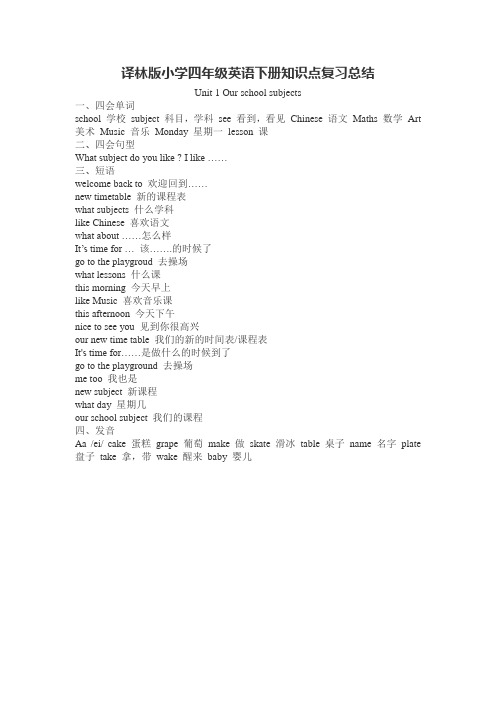
译林版小学四年级英语下册知识点复习总结Unit 1 Our school subjects一、四会单词school 学校subject 科目,学科see 看到,看见Chinese 语文Maths 数学Art 美术Music 音乐Monday 星期一lesson 课二、四会句型What subject do you like ? I like ……三、短语welcome back to 欢迎回到……new timetable 新的课程表what subjects 什么学科like Chinese 喜欢语文what about ……怎么样It’s time for … 该…….的时候了go to the playgroud 去操场what lessons 什么课this morning 今天早上like Music 喜欢音乐课this afternoon 今天下午nice to see you 见到你很高兴our new time table 我们的新的时间表/课程表It's time for……是做什么的时候到了go to the playground 去操场me too 我也是new subject 新课程what day 星期几our school subject 我们的课程四、发音Aa /ei/ cake 蛋糕grape 葡萄make 做skate 滑冰table 桌子name 名字plate 盘子take 拿,带wake 醒来baby 婴儿Unit 2 After school一、四会单词Monday 星期一Tuesday 星期二Wednesday 星期三Thursday 星期三Friday 星期五Saturday 星期六Sunday 星期日get up 起床二、四会句型1.What day is it today ? It’s ……2.What lessons do you have on ……?I have ……3.We don’t have any lessons …4.When do you get up …? I get up at ….三、、短语play table tennis 打乒乓球what day 星期几a football match 一场足球比赛a swimming lesson 一节游泳课all right 好的get up 起床good morning 早上好every day 每天at five 在五点钟what lessons 什么课on Saturday 在星期六play table tennis 打乒乓球what day is it today? 今天星期几?come and play table tennis 来打乒乓球what a pity 真遗憾at school 在学校after school 放学后四、发音Aa / æ / bag书包cap 帽子hamburger 汉堡包sandwich 三明治snack 快餐dad 爸爸Maths 数学match 比赛Saturday 星期六apple 苹果Unit 3 My day一、四会单词usually 通常常常homework 家庭作业二、四会句型When do you get up …I get up …at six /…三、短语go to school 上学at seven forty 在七点四十分in the morning 在早上have lunch 吃午饭in the afternoon 在下午do my homework 做家庭作业have dinner 吃晚饭every day 每天what time 什么时间over there 在那边a big cake 一块大蛋糕like cakes 喜欢蛋糕my day 我的一天four lessons 四节课five subjects 四门课程at seven 在七点watch TV 看电视go to bed 睡觉play football 踢足球in the evening 在晚上at night 在夜里四、发音E e / i: / me 我she 她green 睡觉sleep 睡觉three 三week 星期,周see 看到meet 遇见evening 晚上Unit 4 Drawing in the park一、四会单词park 公园draw 画flower 花them 他们,她们,它们boat 小船river 河,江lake 湖,湖泊二、四会句型What can you do ?I can draw /make a cake /… Good night.三、短语draw some pictures 画一些画good idea 好主意over there 那边some flowers 一些花draw them 画它们on the river 在河面上this big box 这只大盒子have a look 看一看on the lake 在湖面上try again 再试一试in the park 在公园里some pictures 一些图画well done 好样的,干得好can you draw 你会画吗?in the boat 在小船里drawing in the park 在公园里画画a tree 一棵树five trees 五棵树on the hill 在小山上see a boat 看到一条小船make a cake 做一个蛋糕before ten 十点之前四、发音e / e / bed 床desk 课桌,书桌pen 钢笔red 红色的ten 十friend 朋友them 他们pencil 铅笔Wednesday 星期三welcome 欢迎Unit 5 Seasons一、四会单词season 季节spring 春天,春季warm 温暖summer 夏天hot 热的,炎热的autumn 秋天,秋季cool 凉爽的,凉快的winter 冬天,冬季cold 冷的二、四会句型It is spring / summer / autumn / winter It is … I go … I like …三、短语in spring 在春天fly kites 放风筝go boating 去划船in summer 在夏天eat ice cream 吃冰激凌go swimming 去游泳in autumn在秋天have picnics 举行野餐go climbing 去爬山in winter 在冬天make snowmen 堆雪人go skating 去滑冰a fine day 晴朗的一天your jacket 你的夹克衫your bag 你的包whose bag 谁的包look at 看…….my dress 我的连衣裙too short 太短了your trousers 你的裤子too long 太长了go to the party 去参加聚会so big 真大whose gloves 谁的手套my father’s 我爸爸的whose dress 谁的连衣裙so beautiful 真漂亮can move 能移动my hand 我的手four seasons四个季节like spring喜欢春天in autumn在秋天a fine day一个晴朗的日子a sunny day一个晴朗的日子very cold非常冷here’s your jacket这儿有你的夹克衫all like the kite都喜欢这个风筝四、发音i / ai / Chinese 语文kite 喜欢like 喜欢time 时间white 白色的fine 晴朗的climb 爬like 喜欢lion 狮子rice 米饭Unit 6 Whose dress is this ?一、四会单词dress 连衣裙party 聚会coat 外衣,外套shirt (男士)衬衫sweater 毛衣hand 手二、四会句型1.Whose … is this / that ? It’s my father’s…2.Whose … are these / those ? They’re my father’s…3.I think so . What’s the matter?三、短语whose dress谁的连衣裙look at my sweater看我的毛衣try this试试这个your long trousers你的长裤try these试试这些all right好的let’s go to the party让我们去参加聚会look at Su Yang’s gloves看苏阳的手套so big如此大my father’s coat我爸爸的上衣my cousin’s dress我堂姐的连衣裙so beautiful如此美丽you’re wrong你错了you’re right你对了can move能动what’s the matter怎么了I think so我认为是这样let’s play让我们玩吧before eating fish在吃鱼之前listen to some English听一些英语eat my cake by the lake在湖边吃我的蛋糕read and write读和写四、发音i / i / English 英语fish 鱼him 他(宾格)music 音乐pig 猪sixteen 十六listen 听picture 野餐difficult 困难的Unit7 What’s the matter?一、四会单词bad 爸爸water 水ill 生病tired 累的,疲劳的happy 快乐的,高兴的speak 说话,讲话Mrs 夫人,太太二、四会句型1.What’s the matter ? I’m … Here’s some /a …for you. Thank you .2. Good night .三、短语have a pie 吃个馅饼have some water 喝些水go to bed 睡觉good night 晚安all right 好的have a cake 吃块蛋糕what’s the matter怎么了come and have a pie来吃一个馅饼I’m not hungry我不饿have some water喝一些水here you are给你I’m tired我累了want to go to bed想去睡觉good night晚安Mum and Dad妈妈和爸爸I’m thirsty我渴了here’s some wate r这里有水have a cake吃一个蛋糕go home回家show Rose your nose给罗斯看你的鼻子take this pill吃这片药here’s a fan这儿有一把扇子have some water喝一些水here’s a hot dog吃一个热狗talk about feelings谈论感觉四、发音O / / close 关home 家no 不nose 鼻子open 打开go 去cold 冷的old 老的only 仅仅boat 船Unit 8 How are you ?一、四会单词may 可以hear 听到,听见take care 保重at school 在学校二、四会句型1. This is …speaking . May I speak to … ,please .2. I’m sorry to hear that .3. How are you ? Not so good . I have a cold / cough三、、短语speak to 与……交谈come to school 来学校have a cold 感冒take care 保重see you tomorrow 明天见see you 再见at school 在学校have lessons 有课上课on Sunday 在星期日how are you你好吗this is Yang Ling speaking我是杨玲(电话用语)speak to Miss Li和李老师通话can’t come to school today今天不能来学校have a cold and fever感冒又发烧I’m sorry to hear that听到这事我很难过have a headache头疼not so good不太好have a cough咳嗽don’t have any lessons on Sunday在星期天不上课the hot dog in the box在盒子里的热狗go and see Doctor Wu去看吴医生see you after school放学后再见have a cough and a headache咳嗽又头疼talk about some illness谈论一些疾病make a telephone call打个电话四、发音O / / coffee 咖啡dog 狗hot 热not 不是sock 袜子box 盒子long 长的orange 橙子sorry 对不起clock 钟。
译林英语四年级下知识点和语法汇总

译林英语四年级下知识点和语法汇总Prepared on 22 November 2020译林版小学英语四年级下册知识要点Unit1 Our school subjects词汇 school subject see Chinese Maths Art Music lesson Monday PE Science fun go to playground afternoon句型 What subject do you like 你喜欢什么科目I like English. How about you 我喜欢英语。
那你呢I like Science. 我喜欢科学。
Welcome back to school. 欢迎回到学校。
What lessons do you have in the afternoon 你们下午有什么课Unit2 After school词汇 Wednesday Saturday Sunday Tuesday Thursday Friday get up 起床after school 放学后 go match today whenevery day每天句型 I have…我有……He/She has…他/她有……We don’t have…我们没有……What day is it today 今天星期几It’s Monday. 今天星期一。
What a pity! 真遗憾!All right. 好的。
Unit3 My day词汇 usually经常 go to school 去上学 in the morning 在上午in the afternoon在下午go home 回家 homework watch TV 看电视in the evening在晚上have lunch 吃中饭 have dinner 吃晚饭 go to bed 睡觉at night在夜里句型 when do you go to bed 你什么时间睡觉I go to bed at nine. 我9点睡觉Unit4 Drawing in the park词汇 park draw flower them boat river lakedrawing easy difficult try hill again句型 what can you see 你能看到什么I can …我能……Good idea! 好主意!Unit5 Seasons词汇seasons spring warm summer hot autumn cool winter cold fly kite放风筝 go boating 去划船 go swimming 去游泳 picnicgo climbing 去爬山 go skating 去滑冰 fine whose句型 in spring,it is warm 在春天里,它是暖和的。
译林英语四年级下的知识点及语法
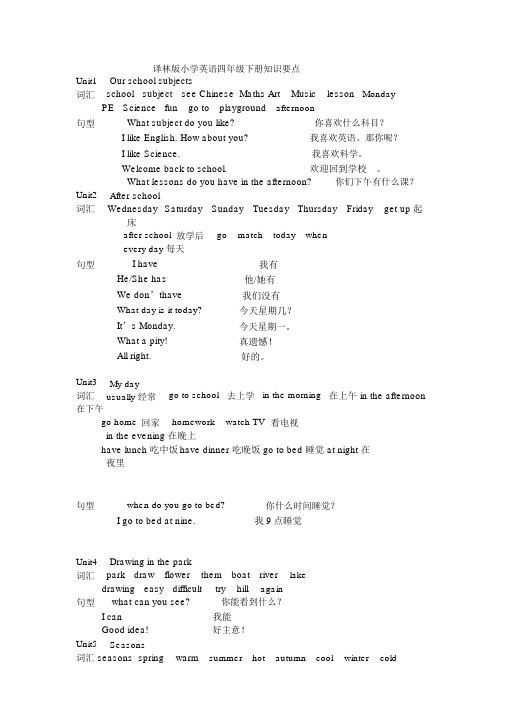
译林版小学英语四年级下册知识要点Unit1词汇句型Unit2词汇Our school subjectsschool subject see Chinese Maths Art Music lesson MondayPE Science fun go to playground afternoonWhat subject do you like?你喜欢什么科目?I like English. How about you?我喜欢英语。
那你呢?I like Science.我喜欢科学。
Welcome back to school.欢迎回到学校。
What lessons do you have in the afternoon?你们下午有什么课?After schoolWednesday Saturday Sunday Tuesday Thursday Friday get up 起床after school放学后go match today whenevery day 每天句型I have我有He/She hasWe don’thave What day is it today? It’s Monday. What a pity!All right.他/她有我们没有今天星期几?今天星期一。
真遗憾!好的。
Unit3词汇My dayusually 经常go to school去上学in the morning在上午 in the afternoon在下午go home回家homework watch TV看电视in the evening 在晚上have lunch 吃中饭have dinner 吃晚饭 go to bed 睡觉 at night 在夜里句型when do you go to bed?I go to bed at nine.你什么时间睡觉?我9点睡觉Unit4词汇句型Drawing in the parkpark draw flower them boat river drawing easy difficult try hill again what can you see?你能看到什么?I can我能Good idea!好主意!lakeUnit5Seasons词汇 seasons spring warm summer hot autumn cool winter cold句型Unit6词汇句型fly kite 放风筝go boating 去划船go swimming 去游泳climbing 去爬山go skating 去滑冰 fine whosein spring,it is warm在春天里,它是暖和的。
全册语法考点整理译林版英语四年级下册

四年级下册译林英语语法考点整理Unit1 Our school subjects 语法考点1.what subjects 和what lessons 的区别及考点what 后面的学科和课要加s ; 即what subjects 和what lessons;what subjects 意思是科目、学科,subjects 一般和like 连用;例:What subjects do you like? 你喜欢什么学科?what lessons 意思是具体的什么课,lessons 一般和have 连用;例:What lessons do you have? 你有什么课?若强调本学期有什么科目,subjects 与have 连用;【易错】What subjects do you have this term(学期)? 这学期你有什么科目啊?what lessons 讲的是每天要上的课,lessons 一般和have连用;2.学科类名词首字母要大写; 例:Science; Chinese3.评价某个学科有趣用It's fun;用this morning; 在早上用in the morning(√)5.操场前面要加the; 例go to the playground;6.多个学科并列时要用逗号隔开(不能用顿号),最后两个单词之间要用and 连接; 例:We have Music, Art, PE and Maths.Unit2 After school 语法考点1.星期考点星期一到星期天分别是:星期一Monday; 星期二Tuesday; 星期三Wednesday;星期四Thursday; 星期五Friday; 星期六Saturday; 星期天Sunday。
英语中,一个星期的第一天是星期天;【易错】Sunday is the first(第一) day of a week(一周).在星期几前面的介词用on; 即on + 星期几; 在星期几的上午或下午直接在星期后加morning 或afternoon; 正确用法:on Sunday morning在星期天上午(√)错误用法:in the morning on Sunday (×)④对星期几提问特殊疑问词用What day; 回答星期几用It's + 星期几。
译林版小学英语四年级下册知识点汇总
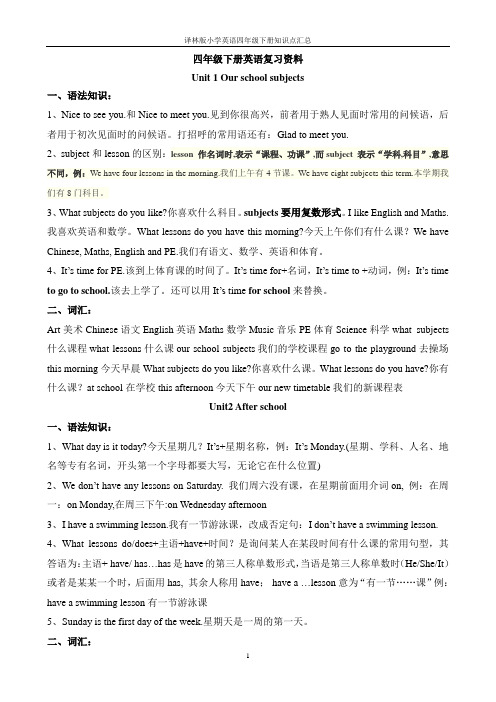
四年级下册英语复习资料Unit 1 Our school subjects一、语法知识:1、Nice to see you.和Nice to meet you.见到你很高兴,前者用于熟人见面时常用的问候语,后者用于初次见面时的问候语。
打招呼的常用语还有:Glad to meet you.2、subject和lesson的区别:lesson 作名词时,表示“课程、功课”,而subject 表示“学科,科目”,意思不同,例:We have four lessons in the morning.我们上午有4节课。
We have eight subjects this term.本学期我们有8门科目。
3、What subjects do you like?你喜欢什么科目。
subjects要用复数形式。
I like English and Maths.我喜欢英语和数学。
What lessons do you have this morning?今天上午你们有什么课?We have Chinese, Maths, English and PE.我们有语文、数学、英语和体育。
4、It’s time for PE.该到上体育课的时间了。
It’s time for+名词,It’s time to +动词,例:It’s time to go to school.该去上学了。
还可以用It’s time for school来替换。
二、词汇:Art美术Chinese语文English英语Maths数学Music音乐PE体育Science科学what subjects 什么课程what lessons什么课our school subjects我们的学校课程go to the playground去操场this morning今天早晨What subjects do you like?你喜欢什么课。
What lessons do you have?你有什么课?at school在学校this afternoon今天下午our new timetable我们的新课程表Unit2 After school一、语法知识:1、What day is it today?今天星期几?It’s+星期名称,例:It’s Monday.(星期、学科、人名、地名等专有名词,开头第一个字母都要大写,无论它在什么位置)2、We don’t have any lessons on Saturday. 我们周六没有课,在星期前面用介词on, 例:在周一:on Monday,在周三下午:on Wednesday afternoon3、I have a swimming lesson.我有一节游泳课,改成否定句:I don’t have a swimming lesson.4、What lessons do/does+主语+have+时间?是询问某人在某段时间有什么课的常用句型,其答语为:主语+ have/ has…has是have的第三人称单数形式,当语是第三人称单数时(He/She/It)或者是某某一个时,后面用has, 其余人称用have;have a …lesson意为“有一节……课”例:have a swimming lesson有一节游泳课5、Sunday is the first day of the week.星期天是一周的第一天。
译林英语四年级下知识点与语法汇总

译林英语四年级下知识点与语法汇总Unit1 Our school subjects词汇school subject see Chinese Maths Art Music lesson Monday PE Science fun go to playground afternoon句型What subject do you like? 你喜欢什么科目?I like English. How about you? 我喜欢英语.那你呢?I like Science. 我喜欢科学.WWhat lessons do you have in the afternoon? 你们下午有什么课?Unit2 After school词汇Wednesday Saturday Sunday Tuesday Thursday Friday get up 起床after school 放学后go match today whenevery day每天句型I have…我有……He/She has…他/她有……We don’t have…我们没有……What day is it today? 今天星期几?It’s Monday. 今天星期一.What a pity! 真遗憾!All right. 好的.Unit3 My day词汇usually经常go to school 去上学in the morning 在上午in the afternoon在下午go home 回家homework watch TV 看电视in the evening在晚上have lunch 吃中饭have dinner 吃晚饭go to bed 睡觉at night在夜里句型when do you go to bed? 你什么时间睡觉?I go to bed at nine. 我9点睡觉Unit4 Drawing in the park词汇park draw flower them boat river lakedrawing easy difficult try hill again句型what can you see? 你能看到什么?I can …我能……Good idea! 好主意!Unit5 Seasons词汇seasons spring warm summer hot autumn cool winter cold fly kite放风筝go boating 去划船go swimming 去游泳picnic go climbing 去爬山go skating 去滑冰fine whose句型in spring,it is warm 在春天里;它是暖和的.We go boating. 我们去划船.Unit6 Whose dress is this?词汇dress party coat shirt sweater handtoo trousers glove so jeans shorts wrong move hurt句型Whose dress is this/that? 这/那是谁的裙子?Whose gloves are thses/those? 这些/那些是谁的手套?It’s/Thry are my father’s. 它是/它们是我父亲的.I think so . 我想是这样.What’s the matter? 怎么了??Unit7 What’s the matter?词汇thirsty water ill tired happydear Mrs speak句型What’s the matter? 怎么了?I’m cold. 我感冒了Can I have some water ? 我能喝些水吗?Here you are. 给你.Come and have…? 来吃……?I want to…我想……Good night. 晚上好.Unit8 How are you?词汇may here take care保重;小心at school在学校句型this is YangLing speak. 我是杨玲.May I speak to Miss Li? 我可以和李小姐说话吗?I’m sorry to hear that. 我很抱歉听到那个.How are you?你好吗?I’m fine,thank you./Not so good. 我很好;谢谢./不太好.See you tomorrow. 明天见.See you .再见.Review & Check Unit1-Unit4Unit1-Unit4课文重点内容详解:1. —What subjects do you like?—I like English and Maths.—Me too.1) “What subjects do you like?”意思是:你喜欢什么科目?这个时候;subject 后面一般会加上“-s”.如果询问“你喜欢哪门课?”;这时候我们可以用”Which subject do you like?”来表示.2) “Me too”是”我也是“意思.2. —Oh! It’s time for PE.—Let’s go to the playground.1) 表示“该是……的时候了./……的时候到了.”我们可以用以下两种句型来表达:It’s time for sth. = It’s time to do sth.eg.: It’s time for breakfast. = It’s time to have breakfast.2) Let’s = Let us 让我们拓展:在操场上:in the playground [英];on the playground [美]3. What lessons do we have this morning?1) lesson的意思是“课、课程”.2) “今天早上、下午和晚上”用“this morning/ afternoon/ evening”来表示;且此时在“this”前不需要加上介词.3) “have”的三单形式是:has .4. I like PE. It’s fun.1) PE是“physics education”的首字母缩写.2) “It’s fun.”相当于“It’s interesting.”;是“很有趣.”的意思.“fun”是不可数名词;表示“乐趣;有趣的事”.拓展:have fun = have a good time 玩得很开心5. —What day is it today? —It’s Wednesday.问“星期几”的英语表达方式:What day is it today? = What’s the day today?英语国家把“星期日”作为一个星期的第一天(“the first day of a week).一个星期七天的英语表达方式:Monday星期一;Tuesday星期二;Wednesday星期三;Thursday星期四;Friday星期五;Saturday星期六;Sunday星期天. 拓展:表示在具体的“星期几”的时候;要用介词on.介词on通常用在表示具体的某一天之前.如:在周六on Saturday;在周六早晨on Saturday morning.而如果没有说具体某一天的早晨;我们仍然用介词in:in the morning/ afternoon/ evening 在早上/下午/晚上.6. I have a swimming lesson. 我有一节游泳课.“swim”是以重读闭音节结尾的单词;后面加上“ing”时;要先双写最后一个辅音“m”.类似的动词有:run-running(跑、跑步);shop-shopping(购物、逛街);sit-sitting(坐);jog-jogging(慢跑);chat-chatting(闲聊、聊天);etc..7. What a pity!(感叹句)真遗憾啊!类似的结构有:What a big egg! 多么大的一个鸡蛋啊!What a beautiful flower! 多么漂亮的一朵花啊!8. —What about Saturday? We don’t have any lesson on Saturday.—All right.1) “What about ... ?”= How about ... ? ……怎么样?此句型用来表示”提议和询问“;后接名词、代词和动名词形式.eg.: What about going to the park? 去公园怎么样?How about going swimming? 去游泳怎么样?2) “don’t”是一般现在时中;当主语非第三人称单数时;疑问句和否定句中;要用do和don’t作助动词;后接动词原形.拓展:当主语是第三人称单数(he, she, it)时;要用助动词does和doesn’t . 3) all right = Ok拓展:That’s all right. 没关系./不用谢.4) 在一般情况下;some用于肯定句;而any用于否定句和疑问句.但当出现下列句型时;我们仍使用some;而不用any:—Would you like some bananas? 您要一些香蕉吗?—Do you want some tea? 您要一些茶吗?—Can I have something to drink? 我能要一些喝的吗?9. I get up at seven. I usually go to school at seven forty. I have four lessons in the morning. I have lunch at twelve.1) get up 起床与get相关的词组拓展:get on 上车get off 下车usually通常;是表示频度的副词;常用于一般现在时中.在英语中;表示频率的副词还有:always总是;oftern经常;sometimes有时;seldom很少、极少;hardly几乎不;never从不;etc..2) go to school 去上学3) in the morning 在早上表示具体某一天的早晨、中午、晚上;要用介词on;如:on Saturday morning;on a cold evening4) have lunch 吃午饭拓展:have breakfast吃早饭;have supper = have dinner吃晚饭注意:在早、中、晚饭前不加定冠词“the”.at seven/ senven forty/ twelve 都是表示具体的时间点;要用介词at .5) 具体时间的表达方式:在8点:at eight ( o’clock )在8点半:at half past eight = at eight thirty在8点10分:at ten past eight = at eight ten在8点50分:at ten to nine = at eight fifty在8点一刻:at a quarter past eight = at eight fifteen在8点三刻:at a quarter to nine = at eight forty-five练习:1: 58 的英语表达__________________________________________10. I have two lessons in the afternoon. I play football at four and go home at four forty. I do my homework at five thirty.1) “play”的用法:play + 运动名称;注意在运动名称前不能加定冠词“the”;如:play volleyball 打排球play + 棋牌类游戏名称;如:play (Chinese) chess 下(象)棋;play cards 打牌play + the + 乐器类名称;注意在乐器类名称前要加定冠词“the”;如:play the piano 弹钢琴;play the violin 拉小提琴;play the guitar 弹吉他play + with + sb.(某人)/ sth.(某物);如:play with me和我玩;play with ballons(气球)/ lanterns(灯笼)play games 玩游戏2) do one’s homework 做(某人的)家(庭)作(业)“work”作为名词;表示“工作”时;是不可数名词;“work”还可作为动词;表示“工作”.拓展:do housework 做家务11. I usually have dinner at six fifteen and watch TV at seven. I go to bed at nine every day.1) 06:15的英语表达方式:six fifteen = a quarter past six2) go to bed 去睡觉3) every day 每天拓展:every second/ minute/ hour/ week/ month/ year 每秒/ 分钟/ 小时/ 周/ 月/ 年12. —I’m hungry, Sam. —山姆;我饿了.—When do you have dinner every day? —你每天几点吃晚饭?—At six. —六点.1) hungry adj. 饿了的;饥饿的【反义词】full同类词:thirsty 渴的;口渴的2) “When”;特殊疑问词;表示“什么时候”;相当于“What time”;只不过“What time”表示的时间比“When”更具体;更精确.在英语中;小学阶段学到的特殊疑问词除了“When”之外;还有:What 什么What + n. ( eg. What colour/ class 什么颜色/ 班级;etc.) Which 哪一个;哪个Who 谁Whom 谁(宾格) Whose 谁的When 什么时候Where 在哪里Why 为什么How 怎样(表方式)How about ... ? = What about + (doing) sth. ? (做) …… 事怎么样?How many + 可数名词复数+ (are there) ? …… (有) 多少?eg.: How many teachers are there in your school? 你们学校有多少老师?How many ball games can you play? 你能打多少种球?How much 10表示“多少钱”? 实际上是“How much money”的缩略问句;“money”意为“钱”;是不可数名词;在口语中一般省略“money”;直接用“How much”表示“多少钱”.10How much + 不可数名词+ ( is there) ? …… (有) 多少?eg.: How much water is there in the bottle? 瓶子里有多少水?How much time do we have to do our homework? 我们有多少时间做家庭作业?3) every + day/ week/ month/ year, etc. 是一般现在时的时间标志词;在肯定的缩略问句、疑问句中和否定句中:10若主语非第三人称单数;我们要使用助动词do和don’t(=do not).eg. A. —Do you go home on foot every day? 你每天都是走路回家吗?—Yes, I do./ No, I don’t.拓展:B. —How often do they go swimming? 他们多久游一次泳?—Twice a month. 一个月两次.10若主语是第三人称单数;我们要使用助动词does和doesn’t(=does not).eg. A. —Does he go to school every day? 他每天都去学校上学吗?—Yes, he does./ No, he doesn’t.B. —How many subjects does your sister have every term? 你姐姐每学期有多少门课?—Ten. 十门课.13. —What time is it now? 现在几点了?—It’s seven o’clock. 七点了.1) What t ime is it now? = What’s the time now?类似的表达时间的句型有:What day is it today? = What’s the day today? 今天星期几?What date is it today? = What’s the date today? 今天几号?2) It’s seven o’clock. 里的It’s 和o’clock 都可以省略.“o’clock”表示……点(整).14. —What can you see over there, Bobby?—I can see a cake.1) over there的意思是“在那儿”;2) 要注意含有情态动词“can;may;must”等的各类句型.15.What a big cake!本句是感叹句.感叹句一般由What和How引导.1) 由What引导的感叹句句式:A. What+a/an+adj.(形容词)+n.(名词) (+it is) ! eg.: What a beautiful flower (it is) !What an important subject (it is) !B. What+adj.+可数名词复数(+they are)! eg.: What beautiful flowers (they are)!C. What+adj.+不可数名词(+it is)!Eg. What good weather(天气) (it is) !2) 由How 引导的感叹句句式”A. How + adj. +(the +主语)+be动词! eg.: How beautiful the flower is!How bad the weather is !B. How+adv.+(the)+主语+行为动词!eg.: How fast he runs.How fast he can run.How fast he is running.How fast he ran.16. —Let’s draw some pictures here.—Good idea.1) draw pictures画画2) Good idea. 好主意.17. —What can you see over there?—I can see a tree and some flowers.—Can you draw them?—Sure. It’s easy.1) “over there”在那边2) “Sure. ”(当然了.)相当于“Certainly./ Of course.”.3) easy的反义词为different/ hard .18. —This is a tree and these are flowers.—Well done.1) 指示代词:this这;这个;these这些that那;那个;those那些2) Well done. 做得好./ 干得好.19. —Can you see the boat on the river? —Yes.—Can you draw it? —It’s difficult, but I can try.—Is this a boat?1) “see”是“看见”的意思;强调看的“结果”.而“look (at)”强调看的“动作”.2) 表示“船、树叶、鸭子等漂在河面上”;可用“on the river”表示.表示“鱼、石头”等在河里;用“in the river”表示.3) river河;lake湖;sea海;ocean洋3) “try”;“尝试;努力”的意思拓展:have a try 试一试try to do sth. 努力做某事try one’s best to do sth. 尽某人全力做某事try doing sth. 尝试做某事Unit5知识点重点词汇单词:spring 春天summer 夏天autumn 秋天winter 冬天warm 温暖的hot 热的cool 凉快的cold 寒冷的词组:in spring /summer/autumn/winter 在春天/夏天/秋天/冬天fly kites 放风筝go boating 去划船like spring 喜欢春天eat ice cream 吃冰激凌go swimming 去游泳have picnics野餐go climbing 去爬山make snowman 堆雪人go skating 去溜冰 a fine day 一个好天气whose bag 谁的包your jacket 你的夹克衫重点句型:1.It is ......in ......是......的.(1)这句话是用来描述某个季节的气候情况的.如:It is warm in spring.春天是温暖的.It is hot in summer.夏天是炎热的. It is cool in autumn.秋天是凉爽的. It is cold in winter.冬天是寒冷的.(2)若要表达在某个季节;要用介词in.如:in winter 在冬天in autumn 在秋天2.We.....in ........我们在.......这句话是用来陈述在某个季节的活动.如:We fly kites in spring.我们在春天放风筝.We make snowman in winter.我们在冬天堆雪人.核心语法:1.本单元涉及到了warm,hot ,cool,cold 这四个形容词;形容词的用法如下:(1)形容词可以作定语修饰名词;一般放在名词的前面.如:I like warm spring.我喜欢温暖的春天.(2)形容词可以作表语放在系动词(be,get,look)的后面;用来说明主语的特征.如:It’s very cool today.今天非常凉爽.(3)形容词可以和副词连用;由于副词的强调作用;表达的意思更深一层.如:Look at my sweater.It’s too small.看我的毛衣;它太小了.Unit6知识点重点词汇单词:coat 外衣;外套dress连衣裙shirt (男士)衬衫shorts 短裤sweater 毛衣glovers 手套jeans 牛仔裤trousers 裤子socks袜子shoes鞋子skirt短裙词组:too short 太短my dress 我的连衣裙too long 太长go to the party 去参加聚会too big 太大whose glovers 谁的手套whose dress 谁的连衣裙my cousin’s我表弟的my father’s 我爸爸的so beautiful 这么漂亮重要句型:1.Try .....试穿....如:Try this jacket 试试这件夹克衫Try this one.试穿这一件Try these trousers.试穿这条裤子. 2......is /are too...... .....太.......表示“太.....(以至于不能.....)”.本句式用来形容某个或某些物品的特征;如:太长;太大;太重等等;使用时要注意单词的单复数形式与be(am/is /are)动词的正确使用.3.--Whose ....is this? 这是谁的.....?--It’s.......是......的.这是一句”询问物主”的特殊疑问句(单数形式),可以用它来询问物主是谁;可用It’s my/your/his/her......或It’s Mike’s/my mother’s.等来回答.它的复数形式是“Whose ....are these/those/they?They’re ........如:--Whose ruler is this?这是谁的尺子?--It’s YangLing’s.是杨玲的.--Whose glovers are these? 这是谁的手套?--They’re Mike’s.核心语法:名词所有格表示名词询问的所有关系.一般在名词词尾加’s,表示“.....的”.具体构成方法如下:1.单数名词词尾加“’s”,如:my father’s watch我父亲的手表2.以s结尾的复数名词只加“’”;如:the students’ books 学生们的书3.不以s结尾的复数名词加“’s”;如:Women’s Day妇女节4.如果某物为两人共有;则在后一个名词后面加“’s”,如:Su Yang and Su Hai’s room 苏洋和苏海的房间;如果不是共有;则两个名词之后都要加“’s”;如:Liu Tao’s and Mike’s fathers 刘涛的爸爸和迈克的爸爸Unit7知识点重点词汇单词:happy 快乐的;高兴的hungry饿的ill病的sad 伤心的thirsty渴的tired累的词组:have a pie吃一块馅饼have some w.ater喝一些水Good night 晚安重要句型1.What’s the matter? 怎么了?这个句式用来询问对方出了什么问题;也可以用“What’s wrong?”或“What’s the matter with you? 回答时用I’m 后接形容词.如”----What’s the matter? ----I’m tired.2.Here’s some water. 这儿有些水.我们以前已经学过This ……is for……(这个……是给……的)3.Are you ill? 你病了吗?如果你想询问对方的状况;就可以使用这个一般疑问句;分别用“Yes, I am”或“No,I’m not.”来回答.例如:----Are you hot?你热吗?----Yes,I am./No,I’m not. 是的;我热./不;我不热.核心语法:want的用法:1.want的意思是“想要”;后面可以直接加名词.如:I want some apples. 我想要一些苹果.2.want后面也可以加动词;要用to加动词原形的形式.如:They want to read books. 他们想要读书.We want to play football. 我们想要踢足球.Some在疑问句中的用法:some是一个“实用派”;它既是肯定句的好朋友;又是疑问句的得力助手;但并不是所有的疑问句都需要some的帮忙;下面这些疑问句中就会看到some的身影:1.表示请求的疑问句.Can I have some orange juice,please? 我能喝些果汁吗?2.表示建议的疑问句.How about some noodles? 来些面条怎么样?3.表示反问的疑问句.Can’t you see some flowers over there? 你难道看不见那边的花吗?4.表示说话人盼望得到肯定答复的疑问句.Can you see some birds in the tree? 你能看到树上有些鸟吗?Unit8知识点重点词汇单词:cold感冒;伤风fever发烧cough咳嗽headache头疼speak to sb.和某人说话see you再见see Doctor Wu看吴医生重点句型1.----How are you?你身体怎么样?----I’m fi ne,thank you./Not so good./i have a cough. 我很好;谢谢./不太好./我咳嗽了.这是树人或朋友之间见面询问对方身体、生活情况时的用语.回答时视具体情况而定.如:----How are you?你身体怎么样?----I have a headache.我头疼.2.I’m sorry to hear that. 听到那我很难过.当别人告诉你身体不舒服时;你可以深表同情地说上这句话.如:----I have a cold. 我感冒了.----I’m sorry to hear that. 听到那我很难过.3.See you tomorrow. 明天见.这是用来道别的一句话.如:----See you in the afternoon. 下午见. ----See you. 再见.核心语法本单元涉及到了电话用语;汉语和英语打电话的习惯不一样:1.当打电话的一方做自我介绍时;应说:“This is……”;意思是“我是……”;而不是“I’m……”.2.如果询问对方是否是某人时;应该用“Is that……?” 意识是“你是……吗?”而不应该说“Are you……?”.3.想要和某人说话;可以用:“May I speak to……?”或“I want to speak to……”.4.询问某人是否在家时;可以说“Is……in?” 如果对方不在家;则可以说:“Sorry,……is out/not in.”.5.如果你想帮对方留个口信;可以说:“Can I take a message for you?”.21 / 21。
译林英语四年级下知识点及语法汇总(K12教育文档)

(完整)译林英语四年级下知识点及语法汇总(word版可编辑修改)编辑整理:尊敬的读者朋友们:这里是精品文档编辑中心,本文档内容是由我和我的同事精心编辑整理后发布的,发布之前我们对文中内容进行仔细校对,但是难免会有疏漏的地方,但是任然希望((完整)译林英语四年级下知识点及语法汇总(word版可编辑修改))的内容能够给您的工作和学习带来便利。
同时也真诚的希望收到您的建议和反馈,这将是我们进步的源泉,前进的动力。
本文可编辑可修改,如果觉得对您有帮助请收藏以便随时查阅,最后祝您生活愉快业绩进步,以下为(完整)译林英语四年级下知识点及语法汇总(word版可编辑修改)的全部内容。
译林版小学英语四年级下册知识要点Unit1 Our school subjects词汇 school subject see Chinese Maths Art Music lesson Monday PE Science fun go to playground afternoon句型 What subject do you like?你喜欢什么科目?I like English。
How about you?我喜欢英语。
那你呢?I like Science。
我喜欢科学.Welcome back to school. 欢迎回到学校。
What lessons do you have in the afternoon? 你们下午有什么课?Unit2 After school词汇 Wednesday Saturday Sunday Tuesday Thursday Friday get up 起床after school 放学后 go match today whenevery day每天句型 I have…我有……He/She has…他/她有……We don't have…我们没有……What day is it today?今天星期几?It’s Monday。
译林英语四年级下知识点和语法汇总

译林版小学英语四年级下册知识要点Unit1 Our school subjects词汇 school subject see Chinese Maths Art Music lesson MondayPE Science fun go to playground afternoon句型What subject do you like?你喜欢什么科目?I like English. Howabout you?我喜欢英语。
那你呢?I like Science.我喜欢科学。
Welcome back to school.欢迎回到学校。
What lessons do you have in the afternoon?你们下午有什么课?Unit2 After school词汇Wednesday Saturday Sunday Tuesday Thursday Friday get up起床after school放学后go match today whenevery day每天句型I have我有He/She has他/她有We don’t have我们没有What day is it today?今天星期几?It ’s Monday.今天星期一。
What a pity!真遗憾!All right.好的。
Unit3 My day词汇usually经常go to school去上学in the morning在上午in the afternoon在下午go home 回家 homework watch TV看电视in the evening在晚上have lunch吃中饭have dinner吃晚饭go to bed睡觉at night在夜里句型when do you go to bed?你什么时间睡觉?I go to bed at nine.我9点睡觉Unit4 Drawing in the park词汇 park draw flower them boat river lakedrawing easy difficult try hill again句型what can you see?你能看到什么?I can我能Good idea!好主意!Unit5 Seasons词汇 seasons spring warm summer hot autumn cool winter coldfly kite放风筝go boating去划船go swimming去游泳picnic goclimbing 去爬山 go skating去滑冰fine whose句型in spring,it is warm在春天里,它是暖和的。
(完整版)译林英语四年级下知识点和语法汇总
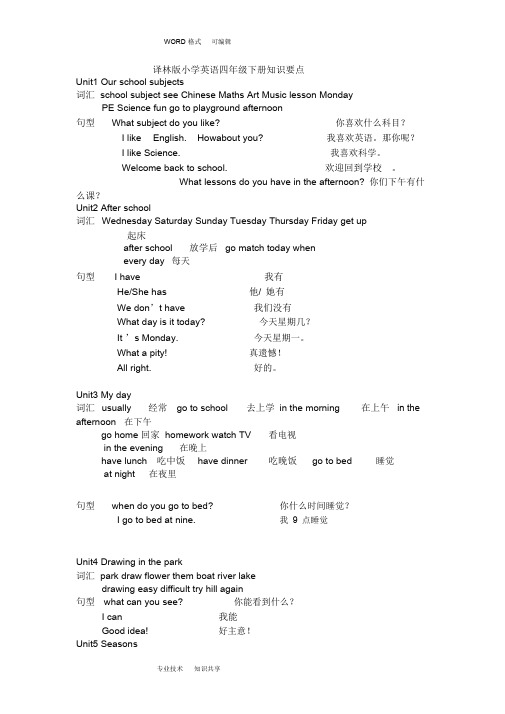
译林版小学英语四年级下册知识要点Unit1 Our school subjects词汇 school subject see Chinese Maths Art Music lesson MondayPE Science fun go to playground afternoon句型What subject do you like?你喜欢什么科目?I like English.Howabout you?我喜欢英语。
那你呢?I like Science.我喜欢科学。
Welcome back to school.欢迎回到学校。
What lessons do you have in the afternoon?你们下午有什么课?Unit2 After school词汇Wednesday Saturday Sunday Tuesday Thursday Friday get up起床after school放学后go match today whenevery day每天句型I have我有He/She has他/她有We don’t have我们没有What day is it today?今天星期几?It ’s Monday.今天星期一。
What a pity!真遗憾!All right.好的。
Unit3 My day词汇usually经常go to school去上学in the morning在上午in the afternoon在下午go home 回家 homework watch TV看电视in the evening在晚上have lunch吃中饭have dinner吃晚饭go to bed睡觉at night在夜里句型when do you go to bed?你什么时间睡觉?I go to bed at nine.我9点睡觉Unit4 Drawing in the park词汇 park draw flower them boat river lakedrawing easy difficult try hill again句型what can you see?你能看到什么?I can我能Good idea!好主意!Unit5 Seasons词汇 seasons spring warm summer hot autumn cool winter coldfly kite放风筝go boating去划船go swimming去游泳picnic goclimbing去爬山 go skating去滑冰fine whose句型in spring,it is warm在春天里,它是暖和的。
译林英语四年级下知识点和语法汇总
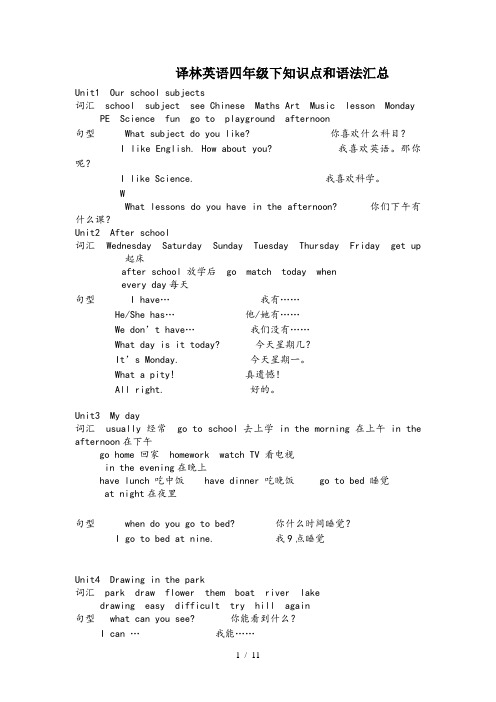
译林英语四年级下知识点和语法汇总Unit1 Our school subjects词汇 school subject see Chinese Maths Art Music lesson Monday PE Science fun go to playground afternoon句型 What subject do you like? 你喜欢什么科目?I like English. How about you? 我喜欢英语。
那你呢?I like Science. 我喜欢科学。
WWhat lessons do you have in the afternoon? 你们下午有什么课?Unit2 After school词汇 Wednesday Saturday Sunday Tuesday Thursday Friday get up 起床after school 放学后 go match today whenevery day每天句型 I have…我有……He/She has…他/她有……We don’t have…我们没有……What day is it today? 今天星期几?It’s Monday. 今天星期一。
What a pity! 真遗憾!All right. 好的。
Unit3 My day词汇 usually经常 go to school 去上学 in the morning 在上午in the afternoon在下午go home 回家 homework watch TV 看电视in the evening在晚上have lunch 吃中饭 have dinner 吃晚饭 go to bed 睡觉at night在夜里句型 when do you go to bed? 你什么时间睡觉?I go to bed at nine. 我9点睡觉Unit4 Drawing in the park词汇 park draw flower them boat river lakedrawing easy difficult try hill again句型 what can you see? 你能看到什么?I can …我能……Good idea! 好主意!Unit5 Seasons词汇seasons spring warm summer hot autumn cool winter cold fly kite放风筝 go boating 去划船 go swimming 去游泳 picnic go climbing 去爬山 go skating 去滑冰 fine whose句型 in spring,it is warm 在春天里,它是暖和的。
江苏译林版小学英语四年级下册单元知识点总结

四下Unit 1 Our school subjects重点词句总结一、单词:1.school学校2.subject课程3.back背部;后面4.see看见,看到5.timetable课程表;时间表6.English英语(课)7.Chinese语文(课)8.Maths数学(课) 9.Art美术(课)10.PE体育(课) 11.Music音乐(课)12.Science科学(课)13.fun乐趣,快乐 14.playground操场15.lesson课16.Monday星期一17.afternoon下午二、词组:1. our school subjects 我们的学校课程2. see you 见到你/(再见)3.like Chinese and Maths 喜欢语文和数学4. what subjects 什么课程5. like English 喜欢英语6. time for PE 该上体育课的时间7. have a Music lesson 有/上一堂音乐课8. what lessons 什么课9. have Art and Maths 有美术课和数学课10. my school subjects 我的学校课程11. welcome back to school 欢迎回到学校12. go to the playground 去操场13. our new timetable 我们的新课程表14. have a Science lesson 有/上一堂科学课15. this morning 今天早上16. this afternoon 今天下午17. like PE 喜欢体育课18. don’t like that / do not like that不喜欢那个19. don’t skate 不要滑冰20. make a cake 做一个蛋糕21. at school 在学校 22. all like Computer Studies 都喜欢电脑课23. write the names of some school subjects 写一些学校课程的名称24. ask about school subjects 询问学校课程三、句子:1. Welcome back to school, class. 欢迎回到学校,同学们。
(完整版)译林英语四年级下知识点及语法汇总
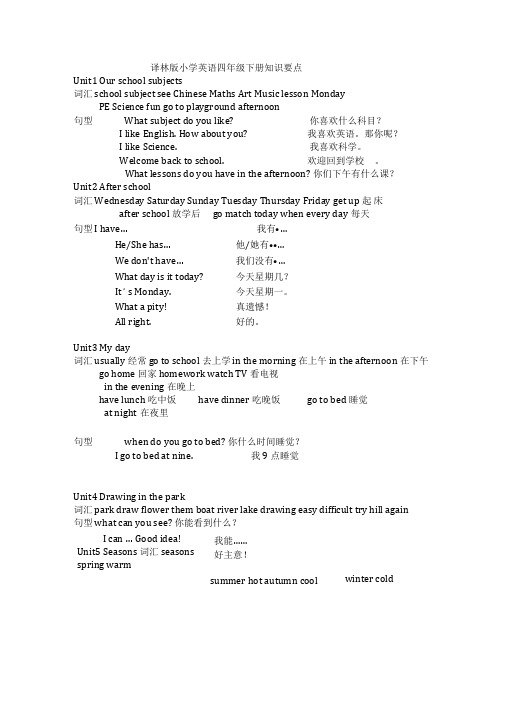
译林版小学英语四年级下册知识要点Unit1 Our school subjects词汇school subject see Chinese Maths Art Music lesson MondayPE Science fun go to playground afternoon句型What subject do you like? 你喜欢什么科目?I like English. How about you? 我喜欢英语。
那你呢?I like Science. 我喜欢科学。
Welcome back to school. 欢迎回到学校。
What lessons do you have in the afternoon? 你们下午有什么课?Unit2 After school词汇Wednesday Saturday Sunday Tuesday Thursday Friday get up 起床after school 放学后go match today when every day 每天句型I have…我有•…He/She has…他/她有••…We don't have…我们没有•…What day is it today? 今天星期几?It ’ s Monday. 今天星期一。
What a pity! 真遗憾!All right. 好的。
Unit3 My day词汇usually 经常go to school 去上学in the morning 在上午in the afternoon 在下午go home 回家homework watch TV 看电视in the evening 在晚上have lunch 吃中饭have dinner 吃晚饭go to bed 睡觉at night在夜里句型when do you go to bed? 你什么时间睡觉?I go to bed at nine. 我9 点睡觉Unit4 Drawing in the park词汇park draw flower them boat river lake drawing easy difficult try hill again句型what can you see? 你能看到什么?I can … Good idea! Unit5 Seasons 词汇seasons spring warm我能……好主意!summer hot autumn cool winter coldfly kite 放风筝 go boating 去划船 go swimming 去游泳 picnic goclimbing 去爬山 go skating 去滑冰 fine whose句型 in spring,it is warm 在春天里,它是暖和的。
新译林版(三起)英语四年级下册全册知识点归纳

四军级下册英语知识点梳理(译林版三起)Unit 1-、重点单词school学校subject课程Chinese 语文(课)Maths数学Music盲乐(课)lesson课Monday星期一二、重点短语1.our school subjects2.like Chinese and Maths3.this morning4.this afternoon5.have lessons三、重点旬子1.Welcome back to school.2.Nice to meet you.3.What subjects do you like?4.I like Chinese and Maths.我们的学校课程喜欢语文和数学今天旱上今天下午上课欢迎回到学校。
很高兴见到你们。
你喜欢什么科目?我喜欢语文相数学。
5.What lessons do we have this morning?今天上午我们上什么课。
6.We have Music and Maths.我们上音乐和数学。
四、旬型结相对”你喜欢什么科目”的句型表达及回答:一What subjects do you like?…I like ...Unit 2Wednesday星期三Saturday星期六Sunday星期天Tuesday星期二Friday星期五get up起床二、重点短语1.a football match2.play table tennis3.a swimming lesson4.on Saturday5.get up三、重点旬子一场足球比赛打乒乓球一节游泳课在周六起床1.What day is it today?今天星期几?2.It’s Wednesday.今天星期三。
3.1 have a swimming lesson.我奇一节游泳课。
4.We don’t have any lessons on Saturday.我们周六没萄课。
5.What a pity !多么遗憾啊!6.AII right.好的。
(完整版)译林版四年级下册知识点
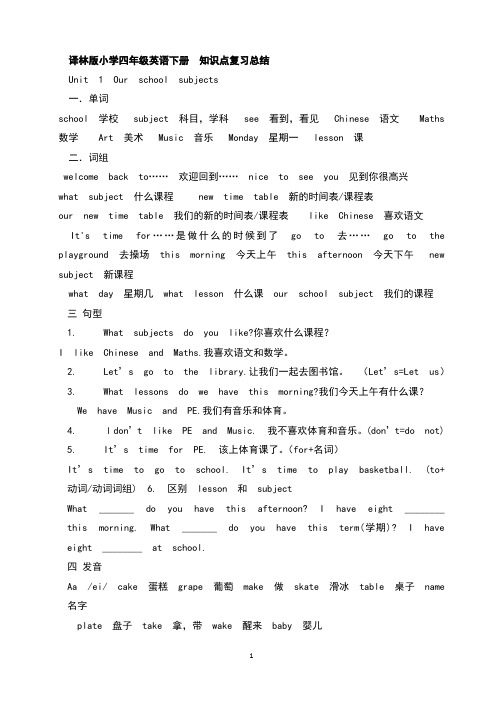
译林版小学四年级英语下册知识点复习总结Unit 1 Our school subjects一.单词school 学校 subject 科目,学科see 看到,看见Chinese 语文Maths 数学 Art 美术Music 音乐 Monday 星期一 lesson 课二.词组welcome back to……欢迎回到……nice to see you 见到你很高兴what subject 什么课程 new time table 新的时间表/课程表our new time table 我们的新的时间表/课程表 like Chinese 喜欢语文It's time for……是做什么的时候到了go to去……go to the playground 去操场this morning 今天上午this afternoon 今天下午 new subject 新课程what day 星期几what lesson 什么课our school subject 我们的课程三句型1.What subjects do you like?你喜欢什么课程?I like Chinese and Maths.我喜欢语文和数学。
2.Let’s go to the library.让我们一起去图书馆。
(Let’s=Let us)3.What lessons do we have this morning?我们今天上午有什么课?We have Music and PE.我们有音乐和体育。
4.Idon’t like PE and Music. 我不喜欢体育和音乐。
(don’t=do not)5.It’s time for PE. 该上体育课了。
(for+名词)It’s time to go to school. It’s time to play basketball. (to+动词/动词词组) 6. 区别lesson 和subjectWhat _______ do you have this afternoon? I have eight ________ this morning. What _______ do you have this term(学期)? I have eight ________ at school.四发音Aa /ei/ cake 蛋糕grape 葡萄make 做skate 滑冰table 桌子name 名字plate 盘子take 拿,带wake 醒来baby 婴儿五练习(一)、单项选择。
完整版)译林英语四年级下知识点及语法汇总

完整版)译林英语四年级下知识点及语法汇总Unit 1: Our School SubjectsXXX。
For example。
"What subject do you like?" and "I like English。
How about you?"Unit 2: After SchoolIn this unit。
we learn about the different activities we can do after school。
such as playing games。
doing homework。
or going to a match。
We also learn how to talk about our daily routines and the days of the week。
For example。
"What day is it today?" and "It's Monday."Unit 3: My DayIn this unit。
we learn about the different parts of the day and what we usually do during each part。
We also learn how to talkabout our daily routines and the different activities we do。
such as going to school。
doing homework。
or watching TV。
For example。
"When do you go to bed?" and "I go to bed at nine."Unit 4: Drawing in the ParkIn this unit。
最新译林英语四年级下知识点及语法汇总备课讲稿
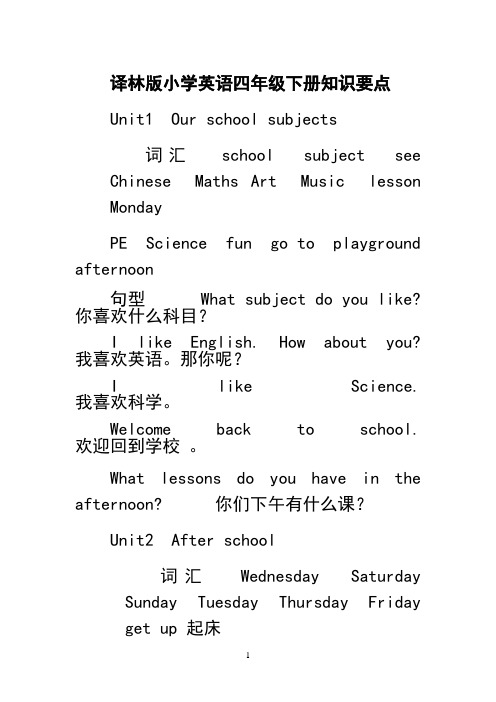
译林版小学英语四年级下册知识要点Unit1 Our school subjects词汇school subject see Chinese Maths Art Music lessonMondayPE Science fun go to playground afternoon句型 What subject do you like? 你喜欢什么科目?I like English. How about you? 我喜欢英语。
那你呢?I like Science. 我喜欢科学。
Welcome back to school. 欢迎回到学校。
What lessons do you have in the afternoon? 你们下午有什么课?Unit2 After school词汇Wednesday SaturdaySunday Tuesday Thursday Fridayget up 起床after school 放学后 go match today whenevery day每天句型I have…我有……He/She has…他/她有……We don’t have…我们没有……What day is it today? 今天星期几?It’s Monday. 今天星期一。
What a pity! 真遗憾!All right. 好的。
Unit3 My day词汇 usually经常 go to school 去上学 in the morning 在上午in the afternoon 在下午go home 回家 homework watch TV 看电视in the evening在晚上have lunch 吃中饭 have dinner 吃晚饭 go to bed 睡觉at night在夜里句型when do you go to bed? 你什么时间睡觉?I go to bed at nine. 我9点睡觉Unit4 Drawing in the park词汇park draw flower themboat river lakedrawing easy difficult try hillagain句型 what can you see? 你能看到什么?I can …我能……Good idea! 好主意!Unit5 Seasons词汇seasons spring warm summer hot autumn cool wintercoldfly kite放风筝 go boating 去划船go swimming 去游泳picnic goclimbing 去爬山go skating 去滑冰fine whose句型 in spring,it is warm 在春天里,它是暖和的。
译林英语四年级下知识点及语法汇总
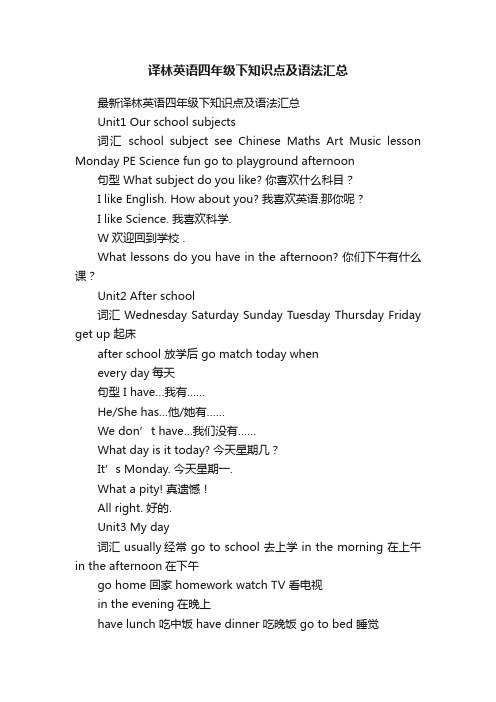
译林英语四年级下知识点及语法汇总最新译林英语四年级下知识点及语法汇总Unit1 Our school subjects词汇school subject see Chinese Maths Art Music lesson Monday PE Science fun go to playground afternoon句型 What subject do you like? 你喜欢什么科目?I like English. How about you? 我喜欢英语.那你呢?I like Science. 我喜欢科学.W欢迎回到学校 .What lessons do you have in the afternoon? 你们下午有什么课?Unit2 After school词汇 Wednesday Saturday Sunday Tuesday Thursday Friday get up 起床after school 放学后 go match today whenevery day每天句型I have…我有……He/She has…他/她有……We don’t have…我们没有……What day is it today? 今天星期几?It’s Monday. 今天星期一.What a pity! 真遗憾!All right. 好的.Unit3 My day词汇 usually经常 go to school 去上学 in the morning 在上午in the afternoon在下午go home 回家 homework watch TV 看电视in the evening在晚上have lunch 吃中饭 have dinner 吃晚饭 go to bed 睡觉at night在夜里句型 when do you go to bed? 你什么时间睡觉?I go to bed at nine. 我9点睡觉Unit4 Drawing in the park词汇 park draw flower them boat river lakedrawing easy difficult try hill again句型 what can you see? 你能看到什么?I can …我能……Good idea! 好主意!Unit5 Seasons词汇seasons spring warm summer hot autumn cool winter cold fly kite放风筝 go boating 去划船 go swimming 去游泳 picnic go climbing 去爬山 go skating 去滑冰 fine whose句型 in spring,it is warm 在春天里,它是暖和的.We go boating. 我们去划船.Unit6 Whose dress is this?词汇 dress party coat shirt sweater handtoo trousers glove so jeans shorts wrong move hurt句型 Whose dress is this/that? 这/那是谁的裙子?Whose gloves are thses/those? 这些/那些是谁的手套?It’s/Thry are my father’s. 它是/它们是我父亲的.I think so . 我想是这样.What’s the matter? 怎么了??Unit7 What’s the matter?词汇 thirsty water ill tired happydear Mrs speak句型What’s the matter? 怎么了?I’m cold. 我感冒了Can I have some water ? 我能喝些水吗?Here you are. 给你.Come and have…? 来吃……?I want to…我想……Good night. 晚上好.Unit8 How are you?词汇 may here take care保重;小心 at school在学校来学校 cold fever cough headache句型 this is YangLing speak. 我是杨玲.May I speak to Miss Li? 我可以和李小姐说话吗?I’m sorry to hear that. 我很抱歉听到那个.How are you?你好吗?I’m fine,thank you./Not so good. 我很好,谢谢./不太好.See you tomorrow. 明天见.See you .再见.Review & Check Unit1-Unit4Unit1-Unit4课文重点内容详解:1. —What subjects do you like?—I like English and Maths.—Me too.1) “What subjects do you like?”意思是:你喜欢什么科目?这个时候,subject后面一般会加上“-s”.如果询问“你喜欢哪门课?”,这时候我们可以用”Which subject do you like?”来表示.2) “Me too”是”我也是“意思.2. —Oh! It’s time for PE.—Let’s go to the playground.1) 表示“该是……的时候了./……的时候到了.”我们可以用以下两种句型来表达:It’s time for sth. = It’s time to do sth.eg.: It’s time for breakfast. = It’s time to have breakfast.2) Let’s = Let us 让我们拓展:在操场上:in the playground [英],on the playground[美]3. What lessons do we have this morning?1) lesson的意思是“课、课程”.2) “今天早上、下午和晚上”用“this morning/ afternoon/ evening”来表示,且此时在“this”前不需要加上介词.3) “have”的三单形式是:has .4. I like PE. It’s fun.1) PE是“physics education”的首字母缩写.2) “It’s fun.”相当于“It’s interesting.”,是“很有趣.”的意思.“fun”是不可数名词,表示“乐趣,有趣的事”.拓展:have fun = have a good time 玩得很开心5. —What day is it today? —It’s Wednesday.问“星期几”的英语表达方式:What day is it today? = What’s the day today?英语国家把“星期日”作为一个星期的第一天(“the first day of a week).一个星期七天的英语表达方式:Monday星期一,Tuesday 星期二,Wednesday 星期三,Thursday星期四,Friday星期五,Saturday星期六,Sunday星期天.拓展:表示在具体的“星期几”的时候,要用介词on.介词on通常用在表示具体的某一天之前.如:在周六on Saturday;在周六早晨on Saturday morning.而如果没有说具体某一天的早晨,我们仍然用介词in:in the morning/ afternoon/ evening 在早上/下午/晚上.6. I have a swimming lesson. 我有一节游泳课.“swim”是以重读闭音节结尾的单词,后面加上“ing”时,要先双写最后一个辅音“m”.类似的动词有:run-running(跑、跑步),shop-shopping(购物、逛街),sit-sitting(坐),jog-jogging(慢跑),chat-chatting(闲聊、聊天),etc..7. What a pity!(感叹句)真遗憾啊!类似的结构有:What a big egg! 多么大的一个鸡蛋啊!What a beautiful flower! 多么漂亮的一朵花啊!8. —What about Saturday? We don’t have any lesson on Saturday.—All right.1) “What about ... ?”= How about ... ? ……怎么样?此句型用来表示”提议和询问“,后接名词、代词和动名词形式.eg.: What about going to the park? 去公园怎么样?How about going swimming? 去游泳怎么样?2) “don’t”是一般现在时中,当主语非第三人称单数时,疑问句和否定句中,要用do和don’t作助动词,后接动词原形.拓展:当主语是第三人称单数(he,she,it)时,要用助动词does和doesn’t .3) all right = Ok拓展:That’s all right. 没关系./不用谢.4) 在一般情况下,some用于肯定句,而any用于否定句和疑问句.但当出现下列句型时,我们仍使用some,而不用any:—Would you like some bananas? 您要一些香蕉吗?—Do you want some tea? 您要一些茶吗?—Can I have something to drink? 我能要一些喝的吗?9. I get up at seven. I usually go to school at seven forty. I have four lessons in the morning. I have lunch at twelve.1) get up 起床与get相关的词组拓展:get on 上车 get off 下车usually通常,是表示频度的副词,常用于一般现在时中.在英语中,表示频率的副词还有:always总是,oftern经常,sometimes有时,seldom很少、极少,hardly几乎不,never从不,etc..2) go to school 去上学拓展:回家,go to bed去睡觉,go to hospital去医院,go to church去做礼拜3) in the morning 在早上表示具体某一天的早晨、中午、晚上,要用介词on,如:on Saturday morning,on a cold evening4) have lunch 吃午饭拓展:have breakfast吃早饭,have supper = have dinner吃晚饭注意:在早、中、晚饭前不加定冠词“the”.at seven/ senven forty/ twelve 都是表示具体的时间点,要用介词at .5) 具体时间的表达方式:在8点:at eight ( o’clock )在8点半:at half past eight = at eight thirty在8点10分:at ten past eight = at eight ten在8点50分:at ten to nine = at eight fifty在8点一刻:at a quarter past eight = at eight fifteen在8点三刻:at a quarter to nine = at eight forty-five练习:1: 58 的英语表达__________________________________________10. I have two lessons in the afternoon. I play football at four and go home at four forty. I do my homework at five thirty.1) “play”的用法:play + 运动名称,注意在运动名称前不能加定冠词“the”,如:play volleyball 打排球play + 棋牌类游戏名称,如:play (Chinese) chess 下(象)棋;play cards 打牌play + the + 乐器类名称,注意在乐器类名称前要加定冠词“the”,如:play the piano 弹钢琴;play the violin 拉小提琴;play the guitar 弹吉他play + with + sb.(某人)/ sth.(某物),如:play with me和我玩;play with ballons(气球)/ lanterns(灯笼)play games 玩游戏2) do one’s homework 做(某人的)家(庭)作(业)“work”作为名词,表示“工作”时,是不可数名词;“work”还可作为动词,表示“工作”.拓展:do housework 做家务11. I usually have dinner at six fifteen and watch TV at seven.I go to bed at nine every day.1) 06:15的英语表达方式:six fifteen = a quarter past six2) go to bed 去睡觉3) every day 每天拓展:every second/ minute/ hour/ week/ month/ year 每秒/ 分钟/ 小时/ 周/ 月/ 年12. —I’m hungry, Sam. —山姆,我饿了.—When do you have dinner every day? —你每天几点吃晚饭?—At six. —六点.1) hungry adj. 饿了的;饥饿的【反义词】full同类词:thirsty 渴的;口渴的2) “When”,特殊疑问词,表示“什么时候”,相当于“What time”,只不过“What time”表示的时间比“When”更具体,更精确.在英语中,小学阶段学到的特殊疑问词除了“When”之外,还有:What 什么 What + n. ( eg. What colour/ class 什么颜色/ 班级,etc.) Which 哪一个,哪个 Who 谁 Whom 谁(宾格) Whose 谁的When 什么时候 Where 在哪里 Why 为什么How 怎样(表方式)How about ... ? = What about + (doing) sth. ? (做) …… 事怎么样? How many + 可数名词复数+ (are there) ? …… (有) 多少?eg.: How many teachers are there in your school? 你们学校有多少老师?How many ball games can you play? 你能打多少种球?How much 6表示“多少钱”? 实际上是“How much money”的缩略问句,“money”意为“钱”,是不可数名词,在口语中一般省略“money”,直接用“How much”表示“多少钱”.6How much + 不可数名词+ ( is there) ? …… (有) 多少?eg.: How much water is there in the bottle? 瓶子里有多少水?How much time do we have to do our homework? 我们有多少时间做家庭作业?3) every + day/ week/ month/ year, etc. 是一般现在时的时间标志词,在肯定的缩略问句、疑问句中和否定句中:6若主语非第三人称单数,我们要使用助动词do和don’t(=do not).eg. A. —Do you go home on foot every day? 你每天都是走路回家吗?—Yes, I do./ No,I don’t.拓展:B. —How often do they go swimming? 他们多久游一次泳?—Twice a month. 一个月两次.6若主语是第三人称单数,我们要使用助动词does和doesn’t(=does not). eg. A. —Does he go to school every day? 他每天都去学校上学吗?—Yes, he does./ No,he doesn’t.B. —How many subjects does your sister have every term? 你姐姐每学期有多少门课?—Ten. 十门课.13. —What time is it now? 现在几点了?—It’s seven o’clock. 七点了.1) What time is it now? = What’s the time now?类似的表达时间的句型有:What day is it today? = What’s the day today? 今天星期几?What date is i t today? = What’s the date today? 今天几号?2) It’s seven o’clock. 里的It’s 和o’clock 都可以省略.“o’clock”表示……点(整).14. —What can you see over there, Bobby?—I can see a cake.1) over there的意思是“在那儿”;2) 要注意含有情态动词“can,may,must”等的各类句型.15.What a big cake!本句是感叹句.感叹句一般由 What和How引导.1) 由What引导的感叹句句式:A. What+a/an+adj.(形容词)+n.(名词) (+it is) !eg.: What a beautiful flower (it is) !What an important subject (it is) !B. What+adj.+可数名词复数 (+they are)!eg.: What beautiful flowers (they are)!C. What+adj.+不可数名词 (+it is)!Eg. What good weather(天气) (it is) !2) 由How 引导的感叹句句式”A. How + adj. +(the +主语)+be动词!eg.: How beautiful the flower is!How bad the weather is !B. How+adv.+(the)+主语+行为动词!eg.: How fast he runs.How fast he can run.How fast he is running.How fast he ran.16. —Le t’s draw some pictures he re.—Good idea.1) draw pictures画画2) Good idea. 好主意.17. —What can you see over there?—I can see a tree and some flowers.—Can you draw them?—Sure. It’s easy.1) “over there”在那边2) “Sure. ”(当然了.)相当于“Certainly./ Of course.”.3) easy的反义词为different/ hard .18. —This is a tree and these are flowers.—Well done.1) 指示代词:this这,这个;these这些that那,那个;those那些2) Well done. 做得好./ 干得好.19. —Can you see the boat on the river? —Yes.—Can you draw it? —It’s difficult, but I can try.—Is this a boat?1) “see”是“看见”的意思,强调看的“结果”.而“look (at)”强调看的“动作”.2) 表示“船、树叶、鸭子等漂在河面上”,可用“on the river”表示.表示“鱼、石头”等在河里,用“in the river”表示.3) river河;lake湖;sea海;ocean洋。
- 1、下载文档前请自行甄别文档内容的完整性,平台不提供额外的编辑、内容补充、找答案等附加服务。
- 2、"仅部分预览"的文档,不可在线预览部分如存在完整性等问题,可反馈申请退款(可完整预览的文档不适用该条件!)。
- 3、如文档侵犯您的权益,请联系客服反馈,我们会尽快为您处理(人工客服工作时间:9:00-18:30)。
译林版小学英语四年级下册知识要点Unit1 Our school subjects词汇school subject see Chinese Maths Art Music lesson Monday PE Science fun go to playground afternoon句型What subject do you like? 你喜欢什么科目?I like English. How about you? 我喜欢英语。
那你呢?I like Science. 我喜欢科学。
Welcome back to school. 欢迎回到学校。
What lessons do you have in the afternoon? 你们下午有什么课?Unit2 After school词汇Wednesday Saturday Sunday Tuesday Thursday Friday get up 起床after school 放学后go match today whenevery day每天句型I have…我有……He/She has…他/她有……We don’t have…我们没有……What day is it today? 今天星期几?It’s Monday. 今天星期一。
What a pity! 真遗憾!All right. 好的。
Unit3 My day词汇usually经常go to school 去上学in the morning 在上午in the afternoon 在下午go home 回家homework watch TV 看电视in the evening在晚上have lunch 吃中饭have dinner 吃晚饭go to bed 睡觉at night在夜里句型when do you go to bed? 你什么时间睡觉?I go to bed at nine. 我9点睡觉Unit4 Drawing in the park词汇park draw flower them boat river lakedrawing easy difficult try hill again句型what can you see? 你能看到什么?I can …我能……Good idea! 好主意!Unit5 Seasons词汇seasons spring warm summer hot autumn cool winter coldfly kite放风筝go boating 去划船go swimming 去游泳picnic go climbing 去爬山go skating 去滑冰fine whose句型in spring,it is warm 在春天里,它是暖和的。
We go boating. 我们去划船。
Unit6 Whose dress is this?词汇dress party coat shirt sweater handtoo trousers glove so jeans shorts wrong move hurt句型Whose dress is this/that? 这/那是谁的裙子?Whose gloves are thses/those? 这些/那些是谁的手套?It’s/Thry are my father’s. 它是/它们是我父亲的。
I think so . 我想是这样。
What’s the matter? 怎么了??Unit7 What’s the matter?词汇thirsty water ill tired happydear Mrs speak句型What’s the matter? 怎么了?I’m cold. 我感冒了Can I have some water ? 我能喝些水吗?Here you are. 给你。
Come and have…? 来吃……?I want to…我想……Good night. 晚上好。
Unit8 How are you?词汇may here take care保重;小心at school在学校come to school 来学校cold fever cough headache句型this is YangLing speak. 我是杨玲。
May I speak to Miss Li? 我可以和李小姐说话吗?I’m sorry to hear that. 我很抱歉听到那个。
How are you?你好吗?I’m fine,thank you./Not so good. 我很好,谢谢。
/不太好。
See you tomorrow. 明天见。
See you .再见。
Review & Check Unit1-Unit4Unit1-Unit4课文重点内容详解:1. —What subjects do you like?—I like English and Maths.—Me too.1) “What subjects do you like?”意思是:你喜欢什么科目?这个时候,subject后面一般会加上“-s”。
如果询问“你喜欢哪门课?”,这时候我们可以用”Which subject do you like?”来表示。
2) “Me too”是”我也是“意思。
2. —Oh! It’s time for PE.—Let’s go to the playground.1) 表示“该是……的时候了。
/……的时候到了。
”我们可以用以下两种句型来表达:It’s time for sth. = It’s time to do sth.eg.: It’s time for breakfast. = It’s time to have breakfast.2) Let’s = Let us 让我们拓展:在操场上:in the playground [英],on the playground [美]3. What lessons do we have this morning?1) lesson的意思是“课、课程”。
2) “今天早上、下午和晚上”用“this morning/ afternoon/ evening”来表示,且此时在“this”前不需要加上介词。
3) “have”的三单形式是:has 。
4. I like PE. It’s fun.1) PE是“physics education”的首字母缩写。
2) “It’s fun.”相当于“It’s interesting.”,是“很有趣。
”的意思。
“fun”是不可数名词,表示“乐趣,有趣的事”。
拓展:have fun = have a good time 玩得很开心5. —What day is it today? —It’s Wednesday.问“星期几”的英语表达方式:What day i s it today? = What’s the day today?英语国家把“星期日”作为一个星期的第一天(“the first day of a week)。
一个星期七天的英语表达方式:Monday星期一,Tuesday星期二,Wednesday星期三,Thursday星期四,Friday星期五,Saturday星期六,Sunday星期天。
拓展:表示在具体的“星期几”的时候,要用介词on。
介词on通常用在表示具体的某一天之前。
如:在周六on Saturday;在周六早晨on Saturday morning。
而如果没有说具体某一天的早晨,我们仍然用介词in:in the morning/ afternoon/ evening 在早上/下午/晚上。
6. I have a swimming lesson. 我有一节游泳课。
“swim”是以重读闭音节结尾的单词,后面加上“ing”时,要先双写最后一个辅音“m”。
类似的动词有:run-running(跑、跑步),shop-shopping(购物、逛街),sit-sitting(坐),jog-jogging(慢跑),chat-chatting(闲聊、聊天),etc.。
7. What a pity!(感叹句)真遗憾啊!类似的结构有:What a big egg! 多么大的一个鸡蛋啊!What a beautiful flower! 多么漂亮的一朵花啊!8. —What about Saturday? We don’t have any lesson on Saturday.—All right.1) “What about ... ?”= How about ... ? ……怎么样?此句型用来表示”提议和询问“,后接名词、代词和动名词形式。
eg.: What about going to the park? 去公园怎么样?How about going swimming? 去游泳怎么样?2) “don’t”是一般现在时中,当主语非第三人称单数时,疑问句和否定句中,要用do和don’t作助动词,后接动词原形。
拓展:当主语是第三人称单数(he, she, it)时,要用助动词does和doesn’t 。
3) all right = Ok拓展:That’s all right. 没关系。
/不用谢。
4) 在一般情况下,some用于肯定句,而any用于否定句和疑问句。
但当出现下列句型时,我们仍使用some,而不用any:—Would you like some bananas? 您要一些香蕉吗?—Do you want some tea? 您要一些茶吗?—Can I have something to drink? 我能要一些喝的吗?9. I get up at seven. I usually go to school at seven forty. I have four lessons in the morning. I have lunch at twelve.1) get up 起床与get相关的词组拓展:get on 上车get off 下车usually通常,是表示频度的副词,常用于一般现在时中。
在英语中,表示频率的副词还有:always总是,oftern经常,sometimes有时,seldom很少、极少,hardly几乎不,never从不,etc.。
2) go to school 去上学拓展:come/go home回家,go to bed去睡觉,go to hospital去医院,go to church 去做礼拜3) in the morning 在早上表示具体某一天的早晨、中午、晚上,要用介词on,如:on Saturday morning,on a cold evening4) have lunch 吃午饭拓展:have breakfast吃早饭,have supper = have dinner吃晚饭注意:在早、中、晚饭前不加定冠词“the”。
